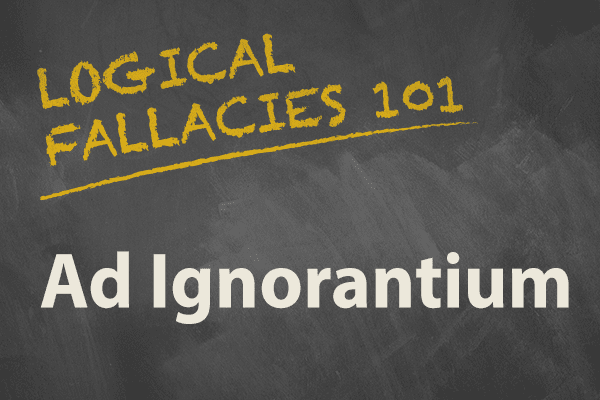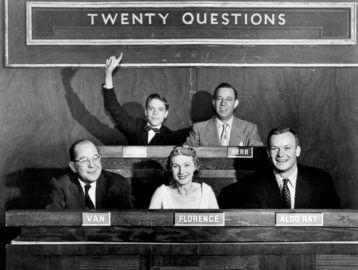By Donald Sanchez,
Introduction
If you’ve been following this blog, you may recall that Fallacies of Weak Induction are logical fallacies that occur when the premises of an argument provide a weak support for the stated conclusion. In this type of fallacy, it’s not the case that the premises are logically irrelevant to the conclusion, but that the relationship between the premises and the conclusion are not strong enough to convince a reasonable person that the conclusion is true given the premises. This week we’ll be looking at another fallacy of weak induction called Argumentum ad Ignorantiam or “Appeal to Ignorance.”
Interested in attending seminary? Click here!
Ad Ignorantiam Definition
The fallacy ad ignorantiam, or an appeal to ignorance, occurs when someone argues that something must be either true or false because it hasn’t been proven to be one way or the other. In other words, a particular belief is said to be true because you do not know that it is not true. The issue typically has to do with something that is either incapable of being proven true or false, or has not yet been proven true or false.
For example, here in the United States, individuals accused of a crime in a court of law are not burdened with proving themselves innocent against a charge that has not been proven. It is the prosecutor who has the burden to prove the guilt of the accused. The prosecutor must show beyond a reasonable doubt that the defendant is guilty. It is not the responsibility of the defendant to prove his own innocence (Hoover, 79-80). A prosecutor would never try to convince a jury that a defendant is guilty just because the defendant could not come up with enough evidence to prove themselves innocent. That would commit the ad ignorantiam fallacy. “Your Honor, we find the defendant guilty because she couldn’t prove her whereabouts the night of the victim’s murder!” This conclusion would never stand in court.
Usually, the burden of proof lies with the one who is making the assertion. You can’t accuse your friend of stealing your iPhone and then ask him to prove he didn’t do it. As the one making the allegation, the burden rests with you to offer proof of the theft. By expecting your friend to prove himself innocent, you are shifting the burden of proof, which generally rests on the person who sets forth the claim (see T. Edward Damer, Attacking Faulty Reasoning,114).
Christians, Atheists, and the Burden of Proof
How often have you heard, “You have no proof that God exists”? The underlying inference is that since you cannot prove God’s existence, it must be the case that God doesn’t exist. This commits the ad ignorantiam fallacy because this person thinks he won the debate by default. In his book Don’t You Believe It: Poking Holes in Faulty Logic, A. J. Hoover points out that this “you have no proof God exists” argument is fallacious for two reasons. He writes,
- First, before you can win by default, you must prove that there are only two possible theories. There may be a third or fourth possibility. It would be silly for one combatant to shout, “I win!” when he had eliminated only one alternative theory and others were waiting to enter the contest. But the naturalist [atheist] may object that we really have only two theories in this matter—theism and naturalism. Would not the failure of one establish the other?
- No, because, second, even if we grant that we have only two theories, the failure to prove one does not prove the other, unless you have some independent evidence to support the remaining theory. If theism cannot be proved, then it is possible that we should just suspend judgment, not opt for naturalism. The most you can conclude is that, at present, we have insufficient data for making a choice between the two [emphasis in original]. (Hoover, 80)
Looking to defend your faith? Click here, and find what you need!
When Does the Absence of Evidence become Evidence?
There are times when the absence of evidence may prove or disprove a claim. Keep in mind, however, that this occurs when there are standard methods of proof that are available and have been used, but there is the failure to prove or disprove a claim. For example, suppose you want to purchase a house, but you’re concerned that the house may be infested with termites. Before you make an offer, you hire a pest control specialist. After a thorough inspection of the house, the specialist cannot find flying swarms of termites, maze like patterns in the floor boards or walls, crumbling or damaged wood, or peeling paint that resembles water damage, etc.
In this case, it would be logically justifiable to conclude that from a lack of evidence of the presence of termites, there is likely no termite infestation in the house. While this may appear to be an argument from ignorance, the difference is important. The negative inference (no signs of termites) is based on an evaluation of the evidence.
- If there is an infestation of termites, then we would find X, Y, Z.
- We do not find X, Y, Z.
- Therefore, there is no infestation of termites.
In contrast, the ad ignorantiam argument is based solely on the fact that no proof is offered for the claim. For someone to argue there are no termites in the house because they simply have not seen any, is to commit an argument from ignorance fallacy. It could very well be the case that there are termites behind walls or under floor boards that just haven’t been seen. In other words, in the first case, there is an appeal to evidence (our examination reveals that we don’t find X, Y, Z, which we would find if there were termites), and in the second, there is an appeal to the “evidence” of no evidence (I just don’t see termites). That is the crucial difference (see Damer, 114).
Examples of Committing the Fallacy
David Silverman, President of American Atheists, was a guest on the FOX News show, The O’Reilly Factor on January 4, 2011. Host Bill O’Reilly debates Silverman on the existence of God. O’Reilly presents his “tides in—tides out” argument. What is that? O’Reilly argues that the oceanic “tides go in and the tides go out, and there is never a miscommunication, and you can’t explain that.” He is concluding God exists based on the fact that atheists cannot (presumably) explain the regularity of the tides in large bodies of water. O’Reilly is committing the ad ignorantiam fallacy. O’Reilly assumes that because Silverman cannot “explain” the cause of the regularity of the tides, that is positive proof for the existence of God. That is fallacious reasoning!
How to Avoid Committing the Ad Ignorantiam Fallacy
To avoid committing this fallacy, it is important to keep in mind the difference between the two claims: (1) I do not have any evidence for X, and the conclusion (2) therefore, X is true. The conclusion (2) does not logically follow from the premise (1). Philosopher Peter Kreeft points out that “ignorance can never be a premise or reason. Premises must express knowledge-claims. Nothing follows from nothing” (Peter Kreeft, Socratic Logic, 86).
If you make a positive claim about something, then you must present positive evidence for it. The absence of another explanation only means that you simply do not know. I hope this article will help you to avoid committing the ad ignorantiam fallacy or recognize it when someone presents it to you.
More examples of the fallacy:
- There are theists who argue that since you cannot disprove God’s existence, He therefore exists. Likewise, there are atheists who argue the opposite—since you cannot prove that a god exists, therefore he doesn’t. In either case, you cannot win the debate by default!
- Barbara is deer hunting and does not see a “No Trespassing” sign anywhere. She concludes it is okay to hunt on the property. The lack of a “No Trespassing” sign is not proof that Barbara is not trespassing on private property.
- Mark, a supermarket manager, tells a friend, “All the employees like my management style because I never heard anyone complain about it.” It could be the case that employees fear reprisals if they criticize Mark, so they keep their criticisms to themselves.
- Robert sees strange lights hovering in the sky and assumes there is no reasonable explanation other than UFOs are flying in the sky. The fact that Robert cannot explain the lights is not positive proof of the presence of UFOs.
- Nancy has not heard from a potential employer two weeks after her interview and concludes she did not get the job. Her “evidence” of not hearing from the potential employer could be due to the fact there are other candidates being interviewed and Nancy is still in the running.
Donald Sanchez has been married for close to 30 years and is the father of two boys and a girl. He moved to Charlotte after retiring from the New York City Police Department after 21 years. He earned a B.A. in Psychology from The King’s College in New York and is completing an M.Div. degree at Southern Evangelical Seminary. He is a church security consultant at Threat Suppression, Incorporated, and oversees their Church Safety and Security Division.
[accordion title=”Bibliography”]
Damer, T. Edward. Attacking Faulty Reasoning: A Practical Guide to Fallacy-Free Arguments 3rd Ed. Belmont: Wadsworth Publishing Company, 1995.
Hoover, A. J. Don’t You Believe It: Poking Holes in Faulty Logic. Chicago: Moody Press, 1982.
Kreeft, Peter. Socratic Logic: A Logic Text Using Socratic Method, Platonic Questions, and Aristotelian Principles. Edited by Trent Dougherty. 3.1 ed. South Bend: St Augustine’s Press, 2014.
[/accordion]



 Donald Sanchez has been married for close to 30 years and is the father of two boys and a girl. He moved to Charlotte after retiring from the New York City Police Department after 21 years. He earned a B.A. in Psychology from The King’s College in New York and is completing an M.Div. degree at Southern Evangelical Seminary. He is a church security consultant at Threat Suppression, Incorporated, and oversees their Church Safety and Security Division.
Donald Sanchez has been married for close to 30 years and is the father of two boys and a girl. He moved to Charlotte after retiring from the New York City Police Department after 21 years. He earned a B.A. in Psychology from The King’s College in New York and is completing an M.Div. degree at Southern Evangelical Seminary. He is a church security consultant at Threat Suppression, Incorporated, and oversees their Church Safety and Security Division.







